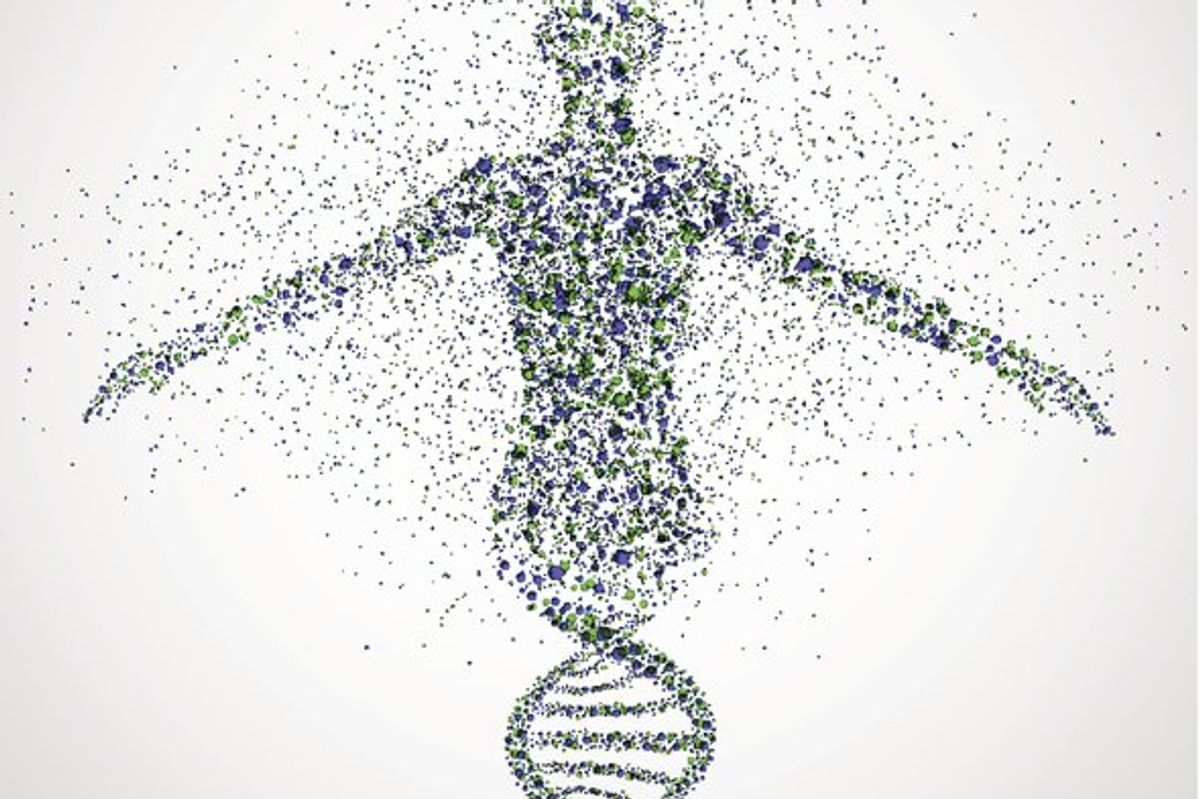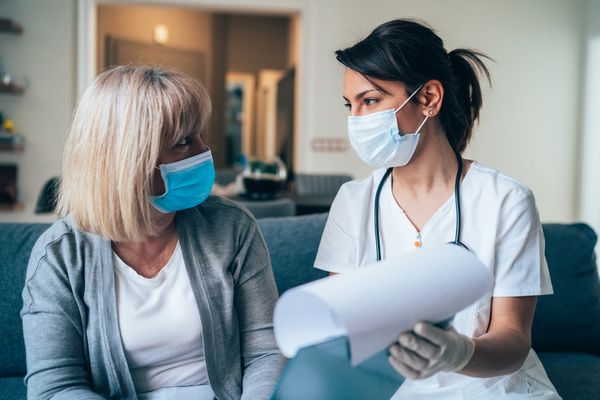It was a Facebook post that caught Angela’s* attention. The 36-year-old had been thinking about genetic testing for years — ever since her sister was diagnosed with breast cancer and tested positive for the BRCA1 gene mutation more than a decade earlier.
Her sister had encouraged the family to get tested — the BRCA1 and BRCA2 mutations can up your breast and ovarian cancer risk considerably — but Angela hadn’t felt ready. She was already dealing with anxiety and obsessive compulsive disorder (OCD), and she wondered how she’d feel about the results or if having the gene would influence her decision to have kids.
Then, last summer, the now mom of two saw a friend’s Facebook post about an at-home genetic testing program that offers a test that checks for more than 60 genetic markers for cancer, including BRCA. Doing it at home — you basically use their “spit kit” and mail in your sample — felt less intimidating to Angela than going in person, so she decided to try it.
About three weeks later Angela got her results: she did have the BRCA1 gene. Though devastated, talking to the company’s genetic counselor about her options helped her feel less overwhelmed. After talking with a gynecologic surgeon, she decided to have a total hysterectomy (removal of her uterus and ovaries) to lower her risk of uterine and ovarian cancer. Before that, though, another doctor from her care team wanted her to have a mammogram and breast ultrasound — which both came back clear.
But because of her genetic predisposition, her doctor took one extra step: an MRI. It was then that they discovered a small mass, which a biopsy later revealed to be stage 1 breast cancer.
Within a few short months, Angela had the recommended hysterectomy and a double mastectomy. Now cancer-free, she’ll start taking medication tamoxifen to lower her risk of the cancer returning.
“They saved my life,” Angela said of the genetic testing company. Without it, she doesn’t know how long it would have been before her cancer was detected. “Because I had this gene, [the doctors then] gave me the MRI,” she said. “It gave them the fuel to go the extra mile, to be extra diligent and that’s when they found [the cancer].”
How do your genes affect your health?
“There are changes in your DNA sequence, or your genes, that make you more likely to develop a particular condition,” explained Elizabeth Jordan, MS, LGC, a licensed genetic counselor and associate professor of internal medicine at the Ohio State University College of Medicine. When this happens, this is referred to as a genetic predisposition.
Experts have identified many genetic conditions — from cystic fibrosis to sickle cell disease to cancer. For instance, some of these are caused by a single gene while others are multiple gene mutations that together make your risk rise, said Jordan.
What genetic conditions should you know about?
Jordan points to three in particular to put on your radar: familial hypercholesterolemia (the official term for genetic high cholesterol), Hereditary Breast and Ovarian Cancer (HBOC) and hereditary non-polyposis colorectal cancer, called Lynch syndrome.
The Centers for Disease Control and Prevention (CDC) puts these in a Tier 1 category meaning there’s evidence that understanding your risk and taking action can be helpful. “Basically these are conditions that are at high frequency in the general population that not only women, but everybody should know about,” Jordan said.
Let’s take a closer look:
Genetic high cholesterol: Approximately 1 out of every 250 people have this common condition. “If your LDL, or bad cholesterol, is around 190 milligrams per deciliter that usually raises a red flag for concern that this is really more driven by genes rather than just having poor dietary habits,” Jordan said.
Hereditary Breast and Ovarian Cancer: From 5 to 10 out of 100 cases of breast cancer are hereditary and 10 to 15 cases of ovarian cancer are hereditary. The most common genes associated with these hereditary cancers are BRCA1 and BRCA2. Having either gene mutation does not mean you will definitely get breast cancer, but women with a BRCA1 or BRCA2 gene mutation have a higher chance of developing breast cancer by age 80 compared to the average woman.
Lynch syndrome: This genetic condition can increase your likelihood of developing colorectal cancer and several other cancers, including endometrial, stomach and uterine cancers. Lynch Syndrome is estimated to be the cause of 3% to 5% of colorectal cancer cases and 2% to 3% of endometrial cancer, according to the American Society of Clinical Oncology.
With all of these diseases, certain symptoms, family history and age of diagnosis — for example, if you’re under 45 and diagnosed with breast cancer — can let doctors (and you) in on whether genetics might be at play.
Knowing this information can be helpful from both a preventive standpoint, like how Angela had a hysterectomy, and for treatment options. For example, if you know you have a family history of high cholesterol, you will know to ask your healthcare provider about medications tailored to your condition. “I am thrilled to finally be in an era where we have drugs for managing cholesterol that are designed specifically for people with genetic high cholesterol,” said Jordan.
What about mental health conditions?
Research suggests that some mental health conditions may also have a genetic component. For instance, in a 2022 study published in the journal Nature, researchers were able to point to a number of genes that may be associated with schizophrenia.
Conditions such as schizophrenia, depression, anxiety and bipolar disorder are considered complex, Jordan said, meaning that both genes and environmental factors tend to be at play for people that develop them. While some genetic testing does exist, a genetic counselor can go over things like family history, age when symptoms start and assessment options to determine if it’s helpful.
Understanding genetic testing
Depending on your circumstances — say, if there are red flags in your family history, like both your mom and grandmother had ovarian cancer — your doctor may recommend genetic testing. (Prenatal genetic counseling and testing is also an option for expectant parents.)
First, a genetic counselor will do a genetic risk assessment that looks at things like family history, often going back three generations, said Jordan. “If you meet the right criteria and if the risk factors are there, then genetic testing would be facilitated,” she said.
Testing — a blood or saliva test — usually happens next and in a clinical setting, though there are also at-home tests. Some of those at-home options are through a clinical lab with medical oversight and genetic counselors available to interpret the results.
Others are what’s known as direct-to-consumer (DTC) genetic testing (think: 23andMe and AncestryDNA). These types of tests can not offer as much detail as clinical tests but can give you some basic insight and can offer interesting information like whether you’re likely to prefer chocolate or vanilla. While these at-home tests can be fun, they should not be a substitute for getting professional genetic counseling if you have a suspected genetic condition.
But no matter what type of test you do, talking to a genetic counselor about your results is key — even if you test negative for genetic markers. Sometimes, your family history alone is enough to recommend continued monitoring.
There are also online tools including the OSU’s Family Health Calculator, which calculates your risk for various genetic conditions based on your family history.
And that can be a good way to begin. “The goal [with the Calculator] is that you have something that you can print or download and show your doctor to start the conversation,” said Jordan.
Working with your genetic testing results
Here’s the thing with genetic testing: It’s important to remember that the results may have a real impact on your life.
“There are some people that aren't there yet,” said Jordan. “They aren't feeling empowered by having this information, but might feel a little bit more fatalistic about it.” And that’s not always a healthy approach. “If it's going to reduce the preventive action you might take, then maybe it’s not the most appropriate thing,” she said.
iIf you are ready and the results show you have a certain genetic predisposition, there are upsides — namely the possible treatment and prevention routes you may be able to take.
And while we have no control over the genes we inherit, there are some things we can control including diet, exercise, making healthy choices, quitting smoking, and preventive care like cholesterol checks, mammograms and colonoscopies.
“Those are all things in our control that we can use to modify what our genetic predisposition makes us more inclined to develop,” Jordan said. “My perspective has always been, knowledge is power.”
*First name only used for privacy
- What You Need to Know About Prenatal Testing ›
- Struggling to Quit Smoking? Your Genes Might Be at Fault ›
- Genetic Testing ›
- The Importance of Understanding Your Family History of Breast Cancer - HealthyWomen ›
- These Sisters Share Everything—Except the BRCA2 Gene Mutation - HealthyWomen ›
- Genetic Counseling: What You Need to Know - HealthyWomen ›
- Surviving a Heart Attack at Age 40: The Common Genetic Disorder I Didn't Know I Had - HealthyWomen ›
- Learn What BRCA Testing Is and Who Should Get BRCA Testing - HealthyWomen ›
- Learn What BRCA Testing Is and Who Should Get BRCA Testing - HealthyWomen ›
- DNA Test Led Me To Find My Father - HealthyWomen ›







